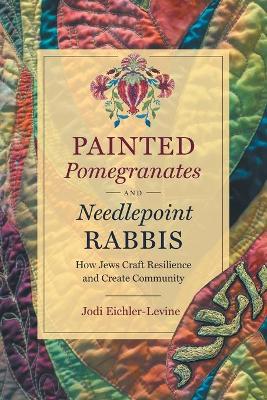Reviewed by annieb123 on
Painted Pomegranates and Needlepoint Rabbis is an interesting and very well written ethnography of crafting and its intersection with Judaica, written by Dr. Jodi Eichler-Levine. Due out 19th Oct 2020 from The University of North Carolina Press, it's 240 pages and will be available in hardcover, paperback, and ebook formats.
This is a meticulously researched and annotated survey course on Judaism and its symbiotic relation to crafting and generative art mostly against the backdrop of the melting pot which is the United States. How, in such an assimilative culture, have Jews managed to hold onto ethnic identity while at the same time integrating into and becoming a part of American culture? How is creating art a part of that identity and how does it relate to Jewishness? While not, strictly speaking, a rigidly academic ethnography (the identities of the subjects are for the most part not anonymized), there is an undeniably academic flavor throughout.
The author is an academic and this is what I would call a layman accessible academic treatise of the subjects in all their incarnations as they intersect culture and history. As an academic work, it is *full* of annotations, notes, illustrations and minutiae (in a good way). The author definitely "shows her work" in full. I loved poring over the notes and the exhaustive bibliography and full chapter notes and annotations (did I mention that this is an academic work?). The notes and references are likely worth the price of admission for anyone interested in the subject and there's obviously been a swoon-inducing amount of time spent on research and resource gathering on the part of the author.
I found the entire book quite interesting and fascinating. It is, admittedly, a niche book and will appeal to readers interested in cultural anthropology and ethnography, but might not appeal to readers looking for an easy read. The language is rigorous and formal. I definitely don't think it's inaccessible for the average reader, but it will take some effort (and I think that's a good thing). This would make a good support text for classroom or library use, for Jewish studies and allied subjects, as well as a superlative read for the particularly arts-history-interested.
Five stars. This is well and deeply researched and engaging.
Disclosure: I received an ARC at no cost from the author/publisher for review purposes.
Reading updates
- Started reading
- 15 September, 2020: Finished reading
- 15 September, 2020: Reviewed
